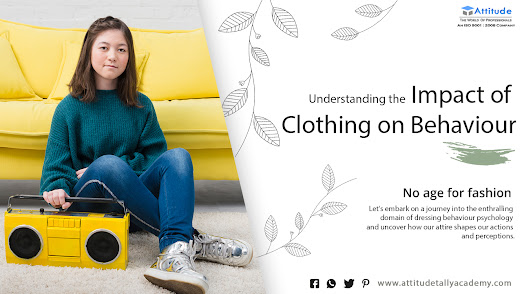Fashion Psychology: Understanding the Impact of Clothing on Behaviour
Introduction:
In the world of fashion designing, it's not just about
creating visually appealing outfits; it's also about understanding the
psychology behind clothing choices and their impact on behaviour. Let's dive
into the fascinating realm of dressing behaviour psychology and explore how the clothes we wear
can influence our actions and perceptions.
Dressing behaviour Psychology:
Have you ever noticed how putting on a certain outfit can
change your mood or confidence levels? That's because clothing plays a
significant role in shaping our behaviour. The field of dressing behaviour
psychology delves into the intricate relationship between what we wear and how
we feel and act.
Fashion Decision Making:
Every day, we make numerous decisions about what to wear
based on various factors such as weather, occasion, and personal preferences.
But did you know that our clothing choices can also reflect our personality,
mood, and even socio-economic status? Fashion decision making involves
understanding these underlying motivations behind our style choices.
The Power of Color:
Colours have a profound impact on our emotions and
perceptions. For example, wearing vibrant hues like red or yellow can evoke
feelings of confidence and energy, while softer tones like blue or pastels may
convey tranquillity and harmony. Fashion designers learn to leverage the
psychology of color to evoke specific emotions or convey messages through their
creations.
Body Image and Self-Esteem:
Our clothing choices can significantly influence how we
perceive our bodies and ourselves. Fashion psychology explores the relationship
between body image, self-esteem, and clothing, highlighting how certain styles
or fits can either enhance or detract from our sense of self-worth.
Social Identity and Conformity:
Clothing serves as a powerful means of expressing social
identity and belonging. Whether consciously or unconsciously, we often align
our fashion choices with various social groups or trends to fit in or stand
out. Understanding the dynamics of social identity and conformity is crucial
for fashion designers seeking to create designs that resonate with their target
audience.
Career Opportunities in Fashion Psychology:
Aspiring fashion designers interested in delving deeper into
the psychological aspects of clothing can explore courses or training programs
in fashion psychology. Institutes and training centres offer specialized
courses that cover topics such as consumer behaviour, trend analysis, and
fashion marketing, providing valuable insights for a career in the fashion
industry.
Practical Applications in Design:
By integrating knowledge of fashion psychology into their
design process, fashion designers can create garments that not only look
aesthetically pleasing but also resonate with the emotions and behaviours of
their intended wearers. This deeper understanding allows designers to craft
collections that evoke specific feelings or cater to particular market segments
effectively.
Embracing Individuality:
While understanding the psychology behind clothing is
essential, it's equally important to embrace individuality and personal style.
Fashion is ultimately a form of self-expression, and each person's unique
tastes and preferences should be celebrated. Aspiring fashion designers should
strive to create inclusive designs that empower individuals to express their
identities through clothing.
In conclusion, fashion psychology and fashion decision making offers valuable insights into the
intricate relationship between clothing and behaviour. By understanding the
psychological factors that influence fashion decisions, aspiring fashion
designers can create designs that not only look good but also resonate with the
emotions and identities of their audience. With the right knowledge and
training, the world of fashion becomes not just a realm of aesthetics, but also
a fascinating study of human behaviour and expression.
Suggested Blogs:




Comments
Post a Comment